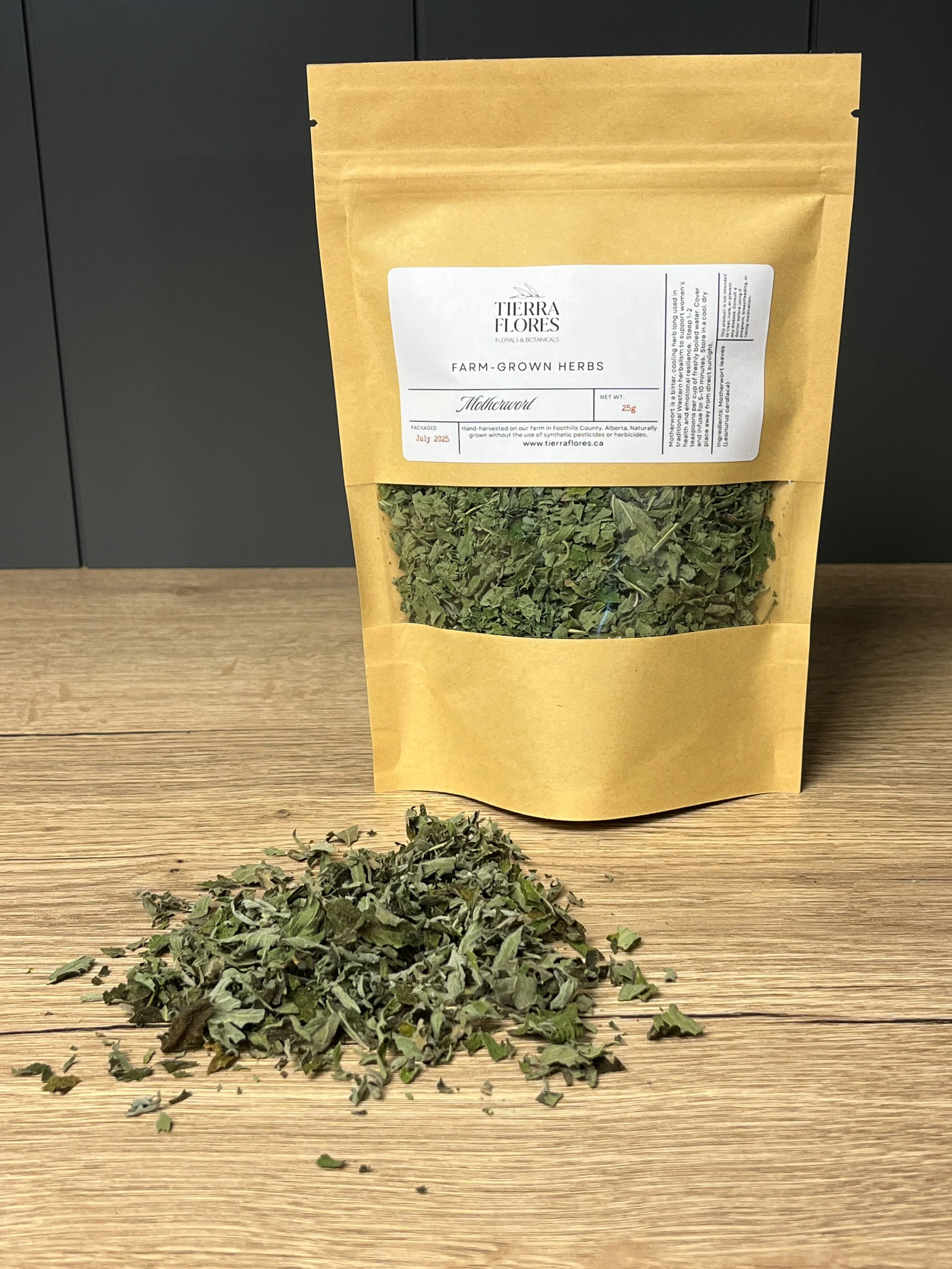 Image 1 of 2
Image 1 of 2

 Image 2 of 2
Image 2 of 2



Motherwort
Motherwort (Leonurus cardiaca) is a deeply valued herb in traditional Western herbalism, known for its calming presence and strong affinity with the heart—both emotionally and physically. A member of the mint family, motherwort grows tall with serrated leaves and soft pink to purple flowers, often found gracing cottage gardens and wild edges alike.
With a slightly bitter, earthy taste and a distinctive herbaceous scent, motherwort is not typically used for flavor alone but is revered for its comforting and grounding effects, especially in times of emotional or hormonal unrest.
Net weight = 25g
Traditional Uses
Motherwort has been used traditionally to:
Soothe occasional nervous tension and emotional unease
Support the physical heart during times of stress
Ease common discomforts associated with menstruation and menopause
Promote a sense of calm and steadiness during hormonal transitions
In Western herbalism, motherwort is often categorized as a nervine (used to calm and restore the nervous system), cardiotonic (supportive to heart function), and emmenagogue (used to support healthy menstrual flow and cycles).
Motherwort contains a range of active compounds that contribute to its effects:
Leonurine – an alkaloid associated with uterine and cardiovascular support
Stachydrine – may support circulation and muscle tone
Flavonoids – antioxidant plant pigments that help maintain cell integrity
Iridoids – bitter compounds believed to have calming and anti-inflammatory actions
Tannins – astringent compounds that support tissue tone
These constituents work together to support the body and mind during times of tension or hormonal fluctuation.
Preparation & Enjoyment
Motherwort is most commonly prepared as a tea or tincture. The flavor is strong and somewhat bitter, so it is often combined with more palatable herbs such as lemon balm, chamomile, or rose.
Ways to use motherwort include:
As a warm infusion in calming, heart-centered blends
As a tincture during emotional or hormonal shifts
In tea blends with herbs like skullcap, milky oats, or tulsi
Occasionally in bitters formulations for digestive and energetic balance
Though not often used for its taste, motherwort’s grounding properties and traditional reputation make it a must-have herb for emotional and hormonal well-being.
🛑 Disclaimer: This information is provided for educational purposes only and is not intended to diagnose, treat, or cure any medical condition. Consult a qualified healthcare practitioner before using herbal products, especially if you are pregnant, nursing, or taking medications.
Motherwort (Leonurus cardiaca) is a deeply valued herb in traditional Western herbalism, known for its calming presence and strong affinity with the heart—both emotionally and physically. A member of the mint family, motherwort grows tall with serrated leaves and soft pink to purple flowers, often found gracing cottage gardens and wild edges alike.
With a slightly bitter, earthy taste and a distinctive herbaceous scent, motherwort is not typically used for flavor alone but is revered for its comforting and grounding effects, especially in times of emotional or hormonal unrest.
Net weight = 25g
Traditional Uses
Motherwort has been used traditionally to:
Soothe occasional nervous tension and emotional unease
Support the physical heart during times of stress
Ease common discomforts associated with menstruation and menopause
Promote a sense of calm and steadiness during hormonal transitions
In Western herbalism, motherwort is often categorized as a nervine (used to calm and restore the nervous system), cardiotonic (supportive to heart function), and emmenagogue (used to support healthy menstrual flow and cycles).
Motherwort contains a range of active compounds that contribute to its effects:
Leonurine – an alkaloid associated with uterine and cardiovascular support
Stachydrine – may support circulation and muscle tone
Flavonoids – antioxidant plant pigments that help maintain cell integrity
Iridoids – bitter compounds believed to have calming and anti-inflammatory actions
Tannins – astringent compounds that support tissue tone
These constituents work together to support the body and mind during times of tension or hormonal fluctuation.
Preparation & Enjoyment
Motherwort is most commonly prepared as a tea or tincture. The flavor is strong and somewhat bitter, so it is often combined with more palatable herbs such as lemon balm, chamomile, or rose.
Ways to use motherwort include:
As a warm infusion in calming, heart-centered blends
As a tincture during emotional or hormonal shifts
In tea blends with herbs like skullcap, milky oats, or tulsi
Occasionally in bitters formulations for digestive and energetic balance
Though not often used for its taste, motherwort’s grounding properties and traditional reputation make it a must-have herb for emotional and hormonal well-being.
🛑 Disclaimer: This information is provided for educational purposes only and is not intended to diagnose, treat, or cure any medical condition. Consult a qualified healthcare practitioner before using herbal products, especially if you are pregnant, nursing, or taking medications.
